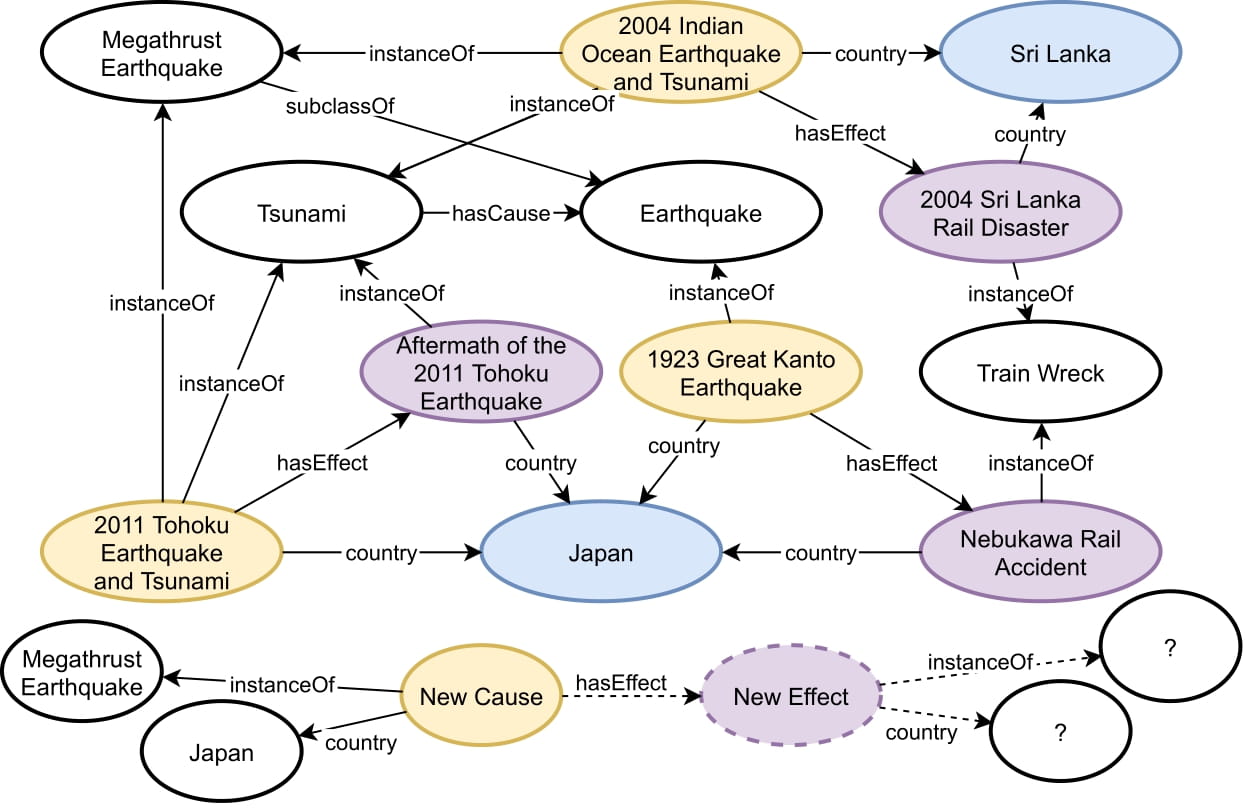This repository contains code for our WWW'23 paper "Event Prediction using Case-Based Reasoning over Knowledge Graphs" (view pre-print pdf) (official paper link to be added)
EvCBR is a case-based reasoning model for performing event prediction using knowledge graphs. The main idea of our work is to (1) frame the task of event prediction as a 2-hop inductive link prediction task, starting from the cause event and making predictions about the effect event's properties, and (2) retrieve cases of similar cause-effect event pairs in the KG in order to learn reasoning paths that can be used to make predictions. Framing our task in this way allows us to make predictions about new, unseen effect events only based on input properties about a cause event.
This repository also contains a copy of our KG of causal event triples, curated from Wikidata. The dataset is also hosted here.
We recommend that you create a new python virtual env and install the requirements. Our experiments were performed using Python 3.8
python -m venv venv/
source env/bin/activate
pip install -r requirements.txt
The experiments can be run using 4 scripts to (1) split the Wikidata-based event data into train/test splits, (2) precompute stats and vectors for entity similarity, (3) run the EvCBR model, then (4) show results.
The following assumes that you have the wikidata dataset placed in the data/ directory.
It's small enough to be uploaded to github so it is already included, but it is also available
at the aforementioned link on Zenodo. Additionally, we have files to specify which classes we
consider to be "events", and a file containing the subclass hierarchy of those events.
To split the data, run:
If desired, you can modify the default arguments such as the output directories.
python experiments/split_wikidata_dataset.py
This will produce a new folders in data/ - pp_wiki/, containing txt files of the
triples in the train/test datasets.
Next, run the script to preprocess the data. The default arguments will point to the correct
data, but you can also specify the input/output directories. From the previous step, the pp_wiki/
folder will be the default input. By default output from this step will be placed in evcbr_pp_wiki/.
python experiments/preprocess_data_for_evcbr.py --process_wiki
To run our model on the experiment data, use the following command.
python experiments/run_evcbr_test.py
--do_reverse_and_predict
--pp_data_dir pp_wiki
--evcbr_pp_data_dir evcbr_pp_wiki
--save_dir wiki_results
--processes 8
--n_cases 5
--n_cases_coverage 3
--n_paths 80
--do_reverse_and_predict will run EvCBR's additional refinement step. Without this tag, only the basic forward
predictions will take place. Note that this flag will make the runtime longer.
--processes is used to enable multiprocessing, which is highly recommended. You will likely need
to adjust the number of processes being run based on what makes sense for your CPU.
Note that increasing the number of processes will also require more memory. In our current Wikidata tests,
each process can require arounf 2GB of memory.
--n_cases and --n_cases_coverage define how many cases from the KG to retrieve in order to
discover prediction paths.
--n_paths determines how many prediction paths are sampled from each case.
In our experiments using 8 processes, this step takes roughly 30 minutes.
Lastly, the results can be output and saved using
python experiments/show_evcbr_eval_results.py --eval_res_dir wiki_results --data_dir pp_wiki
Split train/valid/test data for FB15k-237 and WN18RR are also included in data/.
The preprocess_data_for_evcbr.py can be called with the --process_fb'/--process_wn` flags, and then
the last 2 experiment scripts can be run.
Please keep in mind that the FB15k dataset contains many more triples to predict, the KG is also more
densely connected, which can lead to very long runtimes.
bibtex citation coming soon
